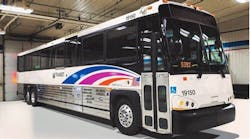NJ Transit explores use of ultraviolet technology to fight against spread of COVID-19
Rutgers University’s Center for Advanced Infrastructure and Transportation (CAIT) will complete a study commissioned by New Jersey Transit (NJ Transit) on the use of ultraviolet-c (UVC) for disinfecting the agency’s bus fleet from viruses such as COVID-19.
The effort continues NJ Transit's commitment to investigating and deploying the latest technology and best practices to provide a clean and safe environment for all customers and employees, according to the agency.
“NJ Transit is always looking to be on the cutting edge of technology,” said NJ Transit President and CEO Kevin Corbett. “As we prepare for our customers’ return to the system, it is incumbent upon us to explore every cleaning and disinfecting option available. NJ Transit will continue to take any and all measures to ensure the safest and cleanest transit environment possible for our customers and employees.”
The study, to be conducted over the next few months, will include examining the effectiveness of the UVC wavelength in killing viruses as well as electronically mapping the interior of different bus models to determine the best placement for the UVC source. The findings will be used to determine the best way to scale and implement the technology on the bus fleet.
NJ Transit says ultraviolet light in the germicidal range (200-280 nm light), known as “UVC,” has proven to be effective at disinfecting water and surfaces and may help reduce the risk of infection due to COVID-19 virus. UVC light energy is not the same as the UVA and UVB light wavelengths found in exposure to sunlight. UVC disinfection would not be used when customers are on board.
